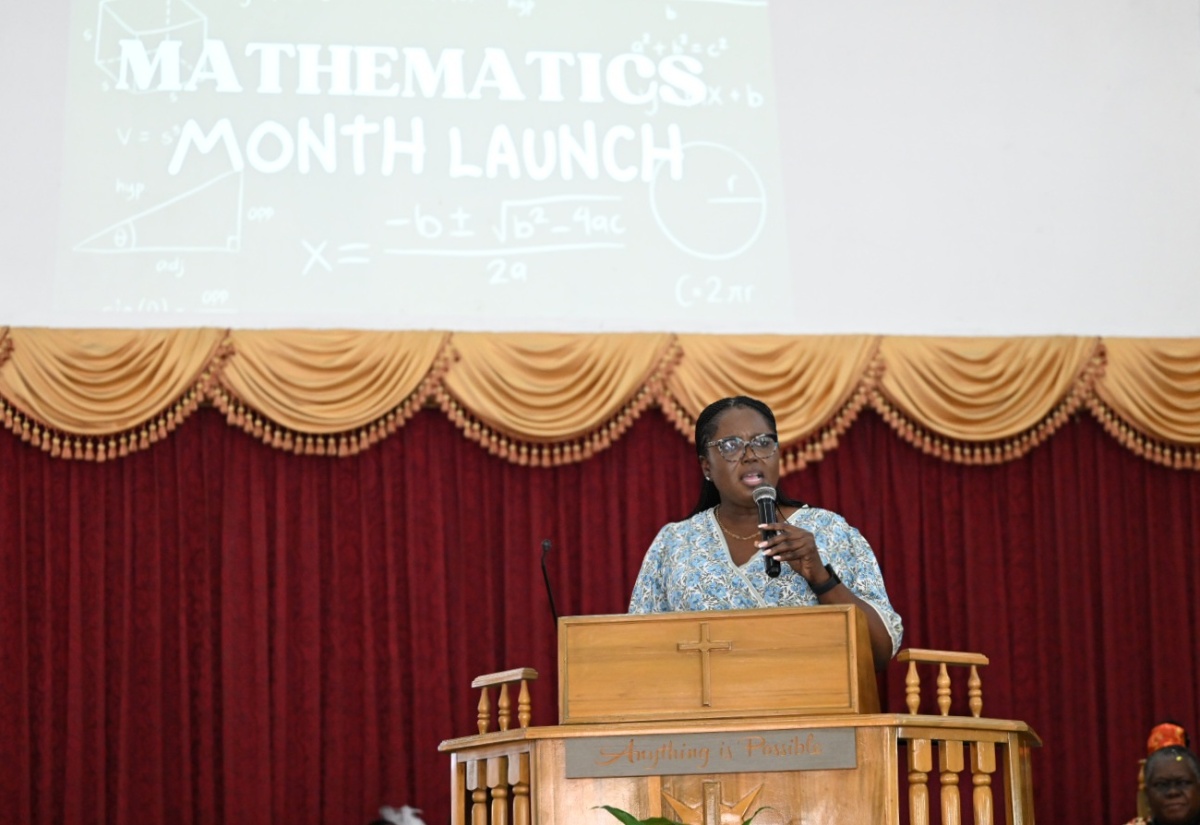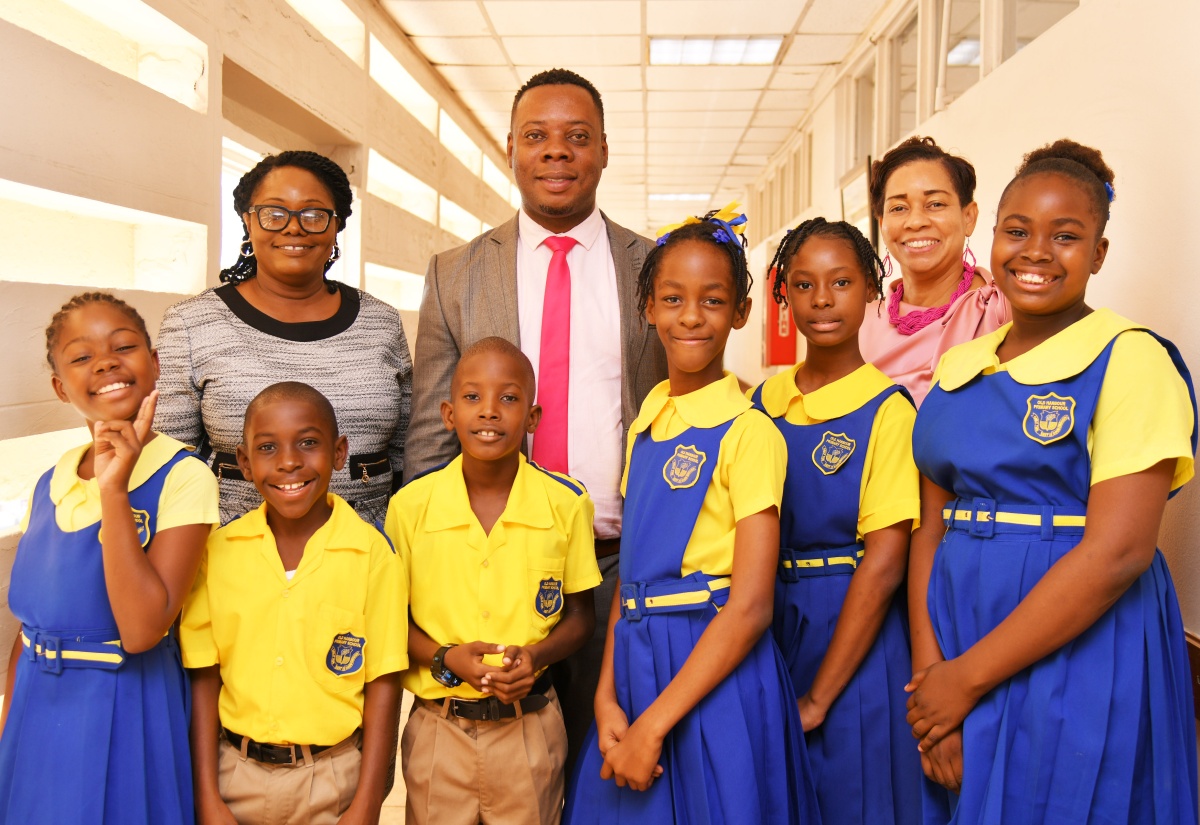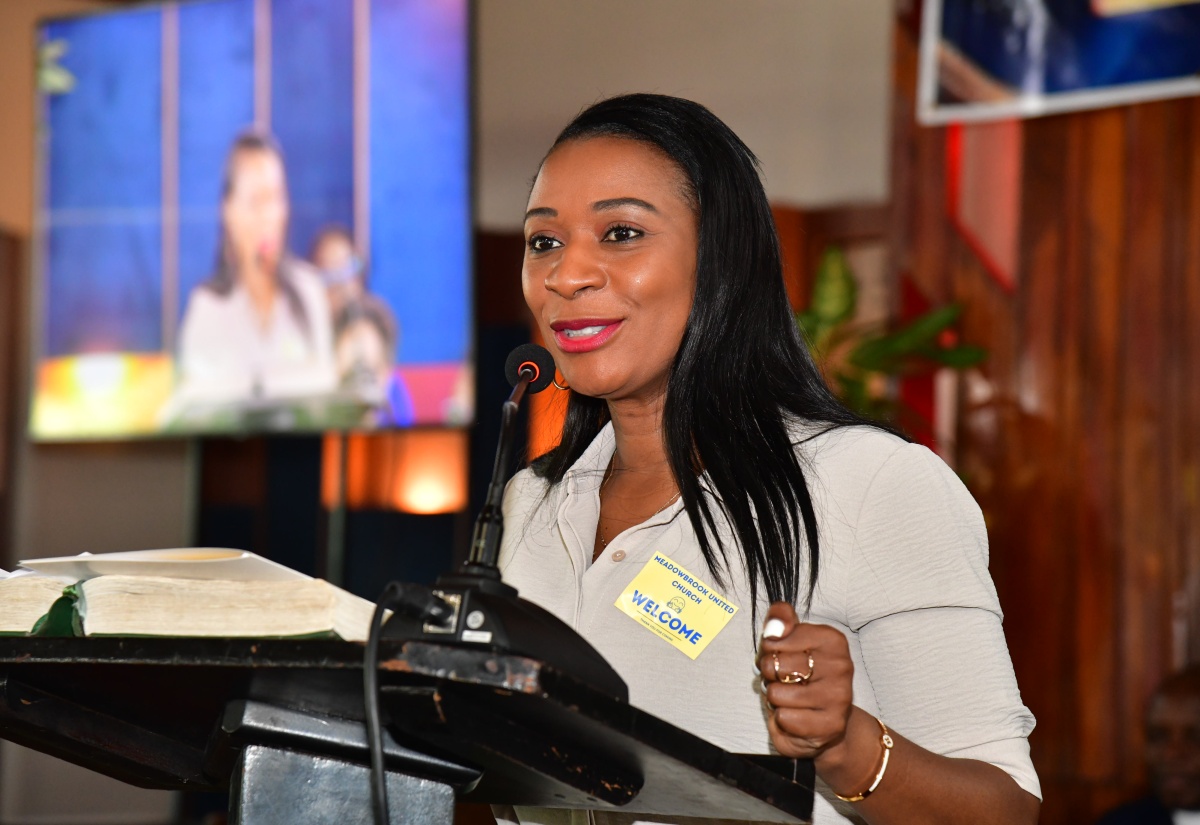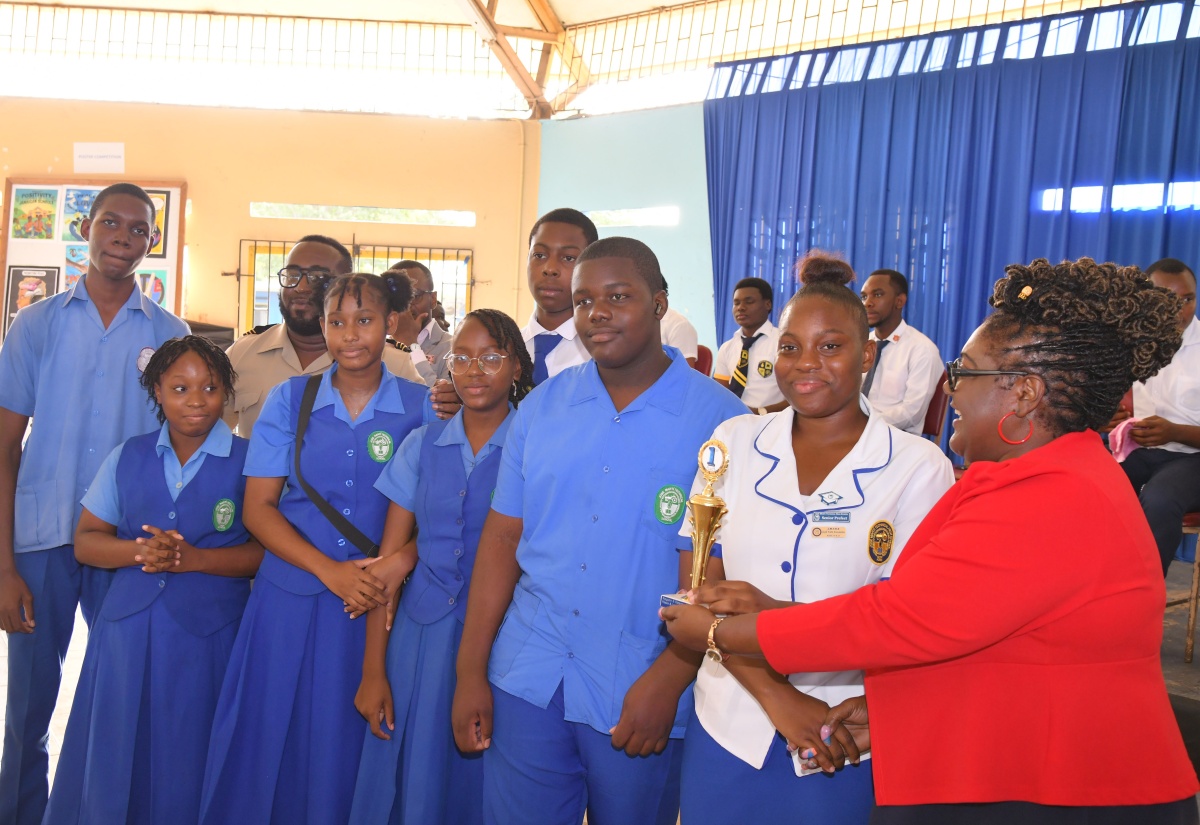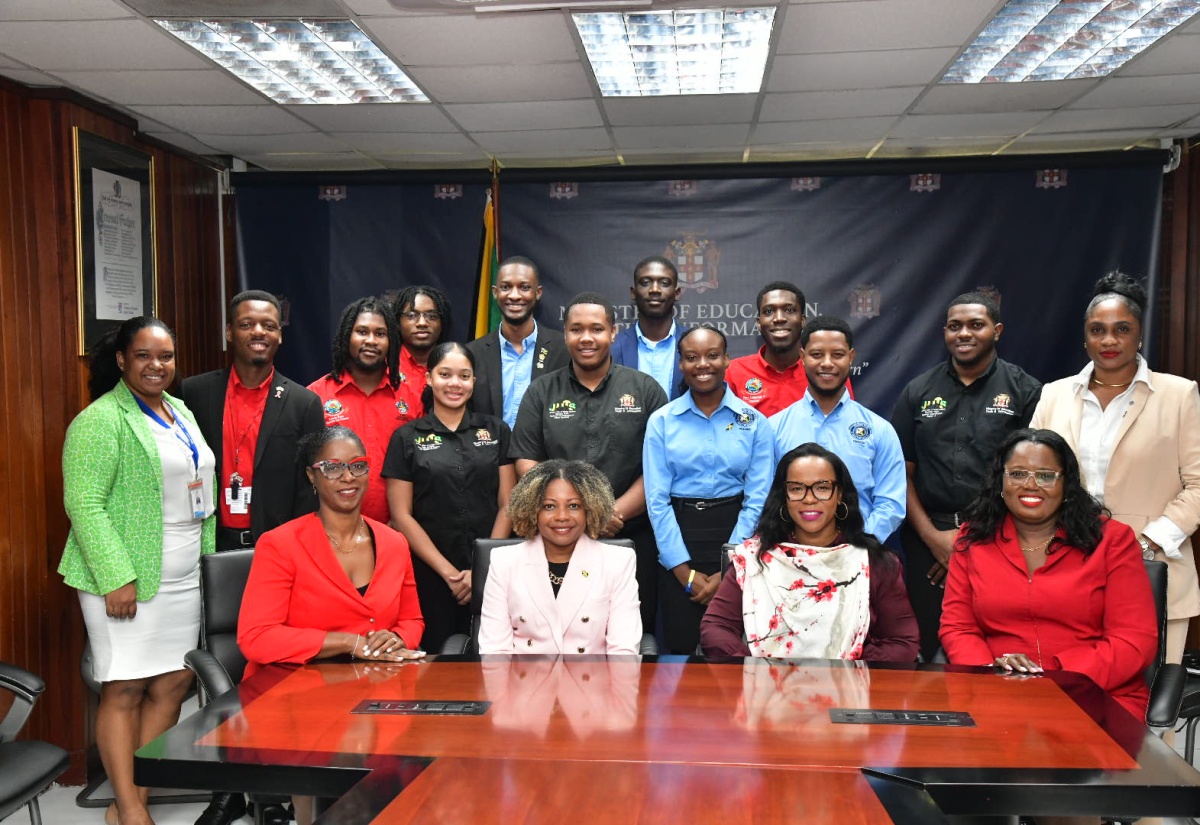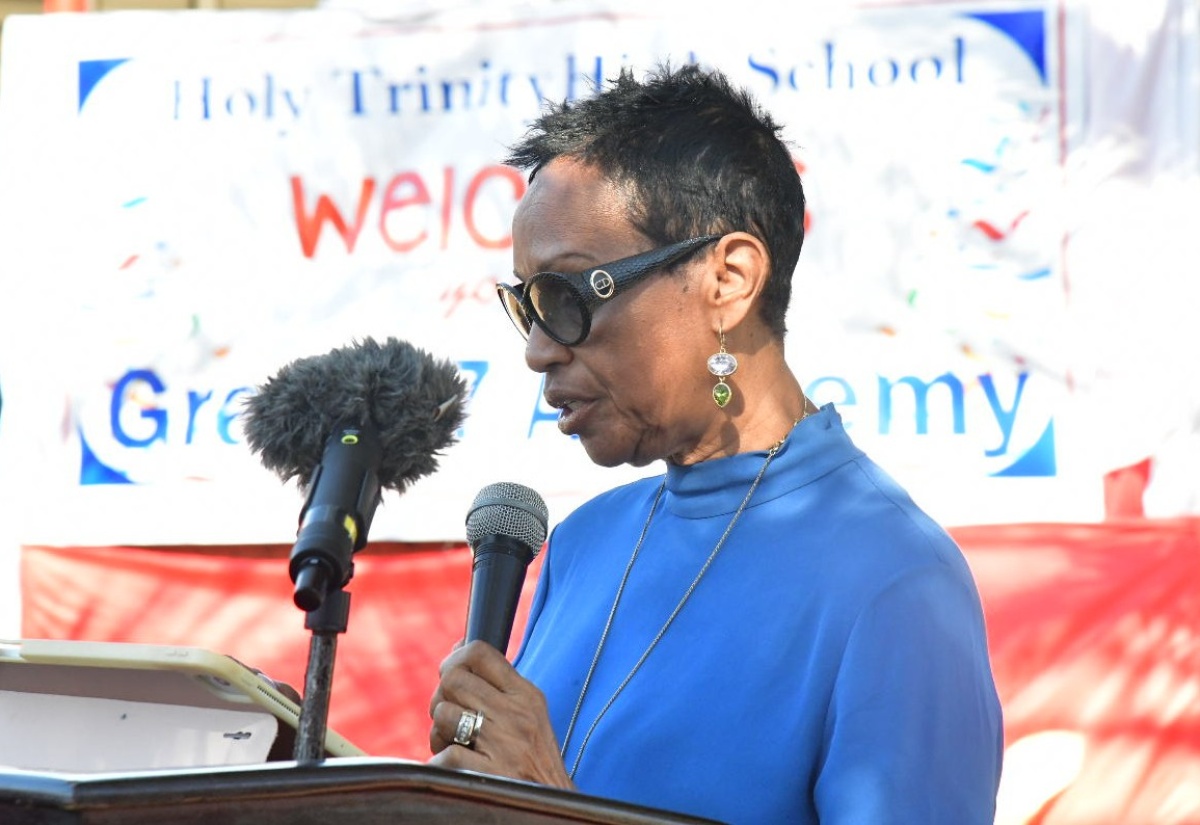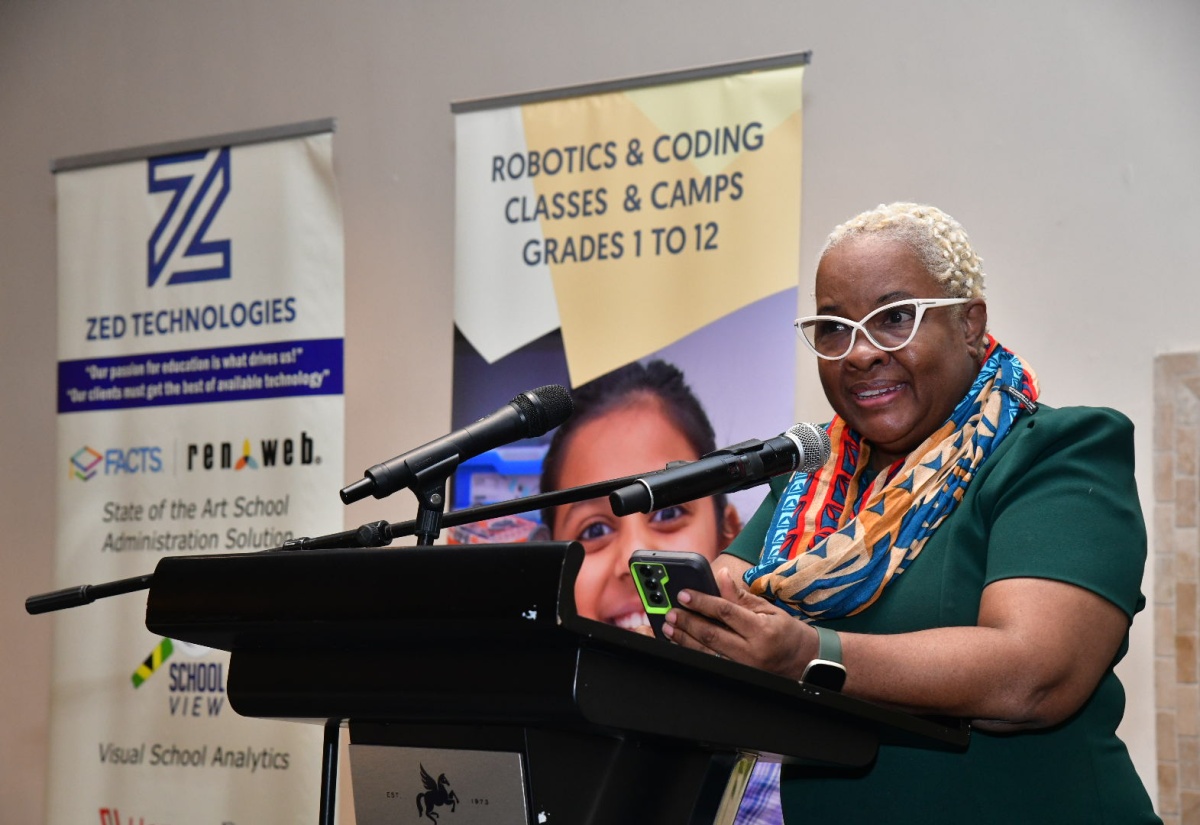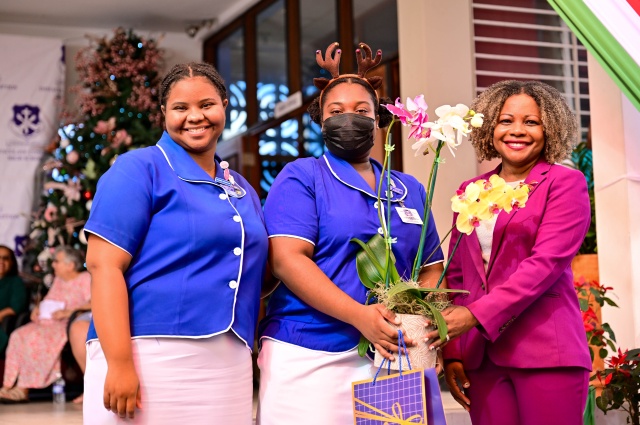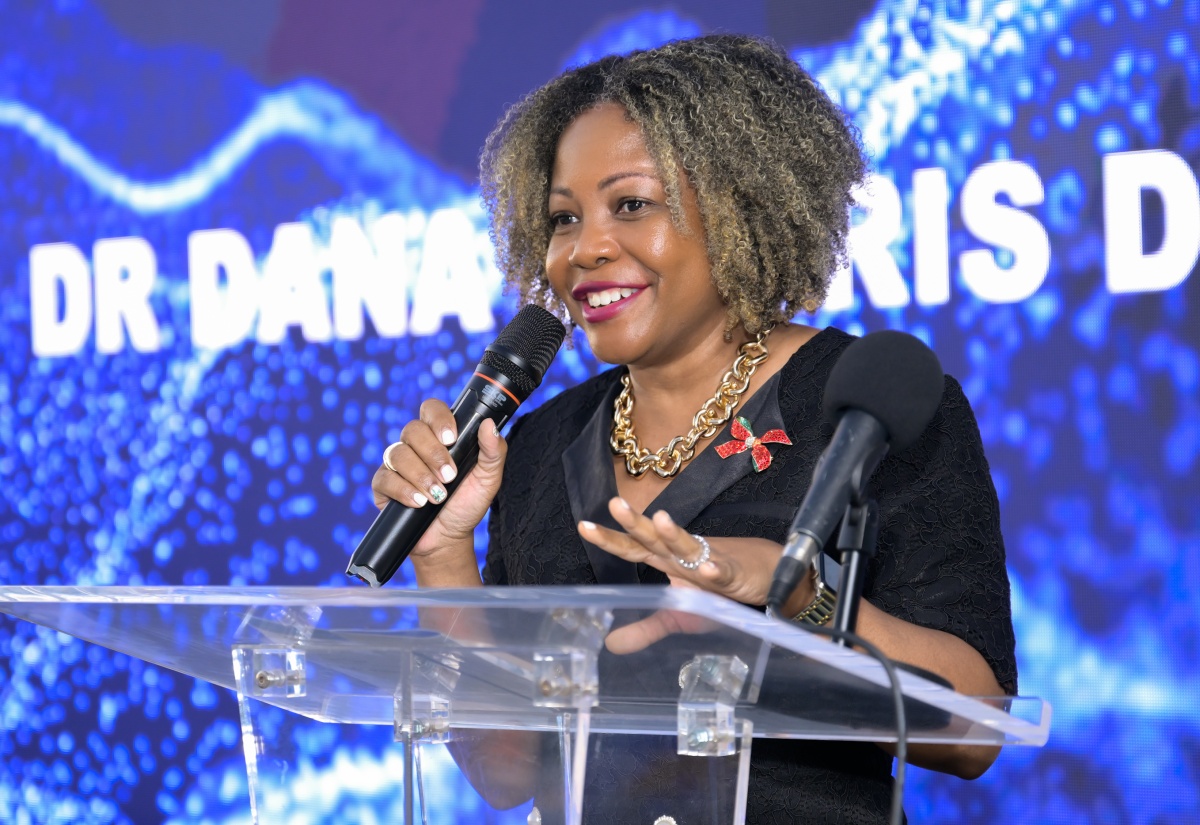Category: Uncategorized
Old Harbour Primary School’s Principal Welcomes Safe Passage Project Implementation
Principal of Old Harbour Primary School in St. Catherine, George Goode, has welcomed the implementation of the Jamaica Social Investment Fund (JSIF) $89.2-million Safe Passage Project at the institution, anticipating a significant enhancement of student safety.
The contract for the project, which falls under the 10th cycle of the Caribbean Development Bank-funded Basic Needs Trust Fund, was signed on Tuesday (February 11) at the Ministry of Education, Skills, Youth and Information in Kingston.
The scope of works includes construction of rails, sidewalks, erection of signage and construction of bus sheds to shield students from the elements as they await transportation at the end of the school day.
“Our school is benefiting from a Safe Passage Programme, and that is simply because we have had a number of experiences over the years where our students have been hit by vehicles on the road.
It’s a very good stretch of road that we’re on, and so what has been happening is that the drivers… and bikers… tend to speed on the road,” Mr. Goode told JIS News.
He also highlighted challenges with indiscipline, noting that students are sometimes not well organised on the road and do not use it wisely.
“Thankfully, we have not had any deaths on the road. What this project is going to do is to prevent that from happening and ensure that the near misses don’t even happen again,” Mr. Goode said.
He further told JIS News that, “the Safe Passage Project will also incorporate the whole matter of building new vendors’ stalls that will be at the side of the school; so, the students won’t have a need now to go across the road, which would put them in danger”, adding that the project is intended to improve road safety education.
“We are really grateful, as a school, for this project that will not only benefit the students but, indeed, it will benefit the community. We just want to say thanks to JSIF and the Caribbean Development Bank for this wonderful partnership with our school,” Mr. Goode said.
HEART/NSTA Trust Preparing Persons to Meet Demand for TVET Skills
The HEART/NSTA Trust, through training and certification, is positioning Jamaicans to meet the global demand for Technical and Vocational Education and Training (TVET)-based careers, which is anticipated to grow significantly in the coming years.
Managing Director of the Trust, Dr. Taneisha Ingleton, said a report from international market research and consulting company, Grand View Research, indicates that the global technical and vocational education market was valued at approximately US$812 billion in 2024, and is projected to expand at a compound annual growth rate of 10 per cent from 2025 to 2030.
She noted that the world of work is changing rapidly, and new skills are emerging to meet the demands of the future.
The agency is offering training in fields like robotics and digital welding to ensure that individuals are equipped to meet the challenges of the future and contribute to both personal and national growth.
“By aligning its work with Vision 2030, the Trust aims to meet the needs of the industries, ensuring that individuals are equipped to fill critical roles. This is to advance national development but also demonstrates our commitment to human development,” Dr. Ingleton said.
She was speaking at the launch of National Career Awareness Week 2025 under the theme ‘Career Success through Self-Development’, at the Meadowbrook United Church in St. Andrew.
The week of observance, from February 9 to 14, is organised by the Ministry of Education, Skills, Youth and Information in collaboration with the HEART/NSTA Trust, Junior Achievement Jamaica and CHOICES.
Education Ministry Champions Use of the Arts in Cultivating Peace in Schools
Parents and teachers are being urged to utilise the transformative power of the arts in cultivating peace, discipline and youth empowerment in schools.
Director of the Safety and Security in Schools Unit in the Ministry of Education, Skills, Youth and Information, Richard Troupe, in making the call, said that “the arts, whether visual art, music, dance, drama or creative writing, offer a powerful avenue for promoting peace and discipline”.
“They provide a safe space for young people to express emotions. The arts allow us to channel complex emotions like anger, frustration or sadness into constructive ways. Painting, writing or playing music are very helpful to process difficult experiences and find inner peace. The arts also build empathy,” he pointed out.
Mr. Troupe was bringing greetings on behalf of Portfolio Minister, Senator Dr. the Honourable Dana Morris Dixon, at the Region 6 Deans of Dicipline Youth Forum and Symposium on Wednesday (February 12) at the Cumberland High School in St Catherine, under the theme ‘Cultivating a Culture of Peace’.
Championing the power of the arts, Mr. Troupe charged parents to support their children’s creative expressions and encourage them to use the medium as a means of communication and self-discovery.
He also reminded parents that they are their children’s first teachers, and as such, the onus is on them to impart important values before they enter society.
“Instil values of respect, tolerance and peaceful conflict resolution; this starts at home. Open communication, active listening and modelling positive behaviour are crucial,” Mr. Troupe said.
As for teachers, he challenged them to integrate the arts into the classroom as a tool for exploring emotions, building empathy and promoting understanding where there are differences.
Mr. Troupe’s message to students was for them to use the arts to cultivate an environment of peace in schools, where diversity is celebrated and inclusivity is promoted.
“Use your voices through the arts to express your concerns, shape your experiences and inspire positive change,” he encouraged.
President of the Region 6 Deans of Discipline and President of the National Association of Deans of Discipline, Dr. Rene Levell, in his remarks, said that cultivating peace is a personal decision that ultimately affects schools and the wider community.
“The aim of this youth forum and symposium is for you (students) to be champions of change [and] as we continue our journey to cultivate a culture of peace, let us remember that it starts with us. Peace begins in our hearts [and] extends to our whole school, flourishes within our churches, communities, and ultimately impacts the world,” Dr. Levell stated.
Member of Parliament (MP) for South Central St. Catherine, Dr. Andrew Wheatley, who delivered the main address, applauded the Region 6 Deans of Discipline for recognising the importance of addressing peace, especially within schools.
“I believe that if students have an appreciation for the whole concept of peace that we will have not only better communities but better families because, oftentimes, they can instruct and advise their parents, and grandparents, cousins and uncles as to why we need to take a softer approach to settle our differences,” he contended.
The first of its kind for Region 6, the youth forum and symposium included a panel discussion where students explored the effects of bullying and cyberbullying and how these can be prevented in schools with help from teachers and administrators.
The event doubled as an awards ceremony for a poster competition, where students were invited to create artwork on the topic ‘Promoting Peace and Discipline in Schools by Empowering Youth Through the Arts’.
Thirteen schools in St. Catherine entered the competition and their work was placed on display to be viewed by those in attendance.
José Martí High School emerged the winner, with Cumberland High School and Bridgeport High School placing second and third, respectively.
Gov’t Continuing Health Sector’s Transformation To Further Enhance Service Delivery
The Government continues to transform the country’s health sector in a bid to further enhance service delivery to more Jamaicans.
This is being done through infrastructural upgrades, acquisition of critical and modern pieces of equipment, training and provision of scholarships, and the introduction of new technology for the digitisation of health records, which helps with efficiency and better patient management.
Prime Minister, Dr. the Most Hon. Andrew Holness, highlighted these during Wednesday’s (January 22) opening ceremony for the health and wellness career exposition and employment fair at the University of the West Indies (UWI) Mona Campus in St. Andrew.
He said infrastructural upgrades are being done to increase the physical capacity at several institutions islandwide, including the Cornwall Regional Hospital, Spanish Town Hospital and University Hospital of the West Indies as well as several type five clinics.
“Until those come to fruition, many persons are still going to be saying we have an access issue, we don’t have enough space. But these are being built. They will come to fruition, [and] you will see a massive improvement in the ability of the health facilities to host patients,” the Prime Minister said.
Dr. Holness further noted that the introduction of modern equipment is being incorporated in the sector through public-private partnerships.
He maintained, however, that critical to the transformation process, is building the human capacity to deliver care.
“We can improve the infrastructure, we can improve the facilities. But to get the care [needed] in health, we have to build the human capacity, and that is what today (Wednesday’s expo) is about in the transformation exercise.
It’s about, now, building the human capacity to allow us to actually deliver care,” the Prime Minister said.
Dr. Holness urged persons who are interested in pursuing a career in healthcare to take advantage of the opportunities available in the sector.
Additionally, he appealed for greater compassion and patience, even as the Government continues to transform the sector.
JUTS Representatives Call on Education Minister
Early Success for Grade 7 Academy Programme
The Grade 7 Academy, which has been operational at Holy Trinity High School in Kingston since September, is already reporting progress in student performance.
The programme, spearheaded by St. Michael’s College in partnership with the Ministry of Education, Skills, Youth and Information, offers an adjusted curriculum focused on remedial reading, writing and numeracy.
Student *Anthony Brown, who is enrolled in the Academy, scored 37 per cent in decoding and 22 per cent in comprehension on his first Reading Progress Indicator (RPI) at the start of the 2024/25 academic year.
After engaging with the curriculum for four months, *Anthony’s performance on the RPI moved to 45 per cent for decoding and 38 per cent in comprehension.
On the Informal Diagnostic Reading Inventory (IDRI), he scored as a primer in September and by December, he was at the grade two level.
Another student *Joel Black, scored 27 per cent in comprehension and zero per cent in decoding, on his first RPI and below pre-primer on the IDRI. By December, *Joel’s score on the RPI improved and he was at the grade one level on the IDRI.
An assessment of the cohort’s reading levels in December found that over 52 per cent of students have improved by at least half of a grade level.
Another 11 per cent showed improvement between 0.6 and 1.5 grade levels and a further 12 per cent improving over 1.5 grade levels and above.
There were also encouraging results in mathematics.
Instructional Leader, Dr. Faith Alexander, shared that the original mathematics diagnostic test in September 2024 was set at the grade-six level, but none of the students were able to engage with the assessment as they could not read the word problems or comprehend what was being asked of them.
“We had to then reassess with a fourth-grade instrument. Of the 170 students, 143 completed the math diagnostic test. Sixty-eight students scored between zero and 23; 45 students scored between 24 and 29; 28 students scored between 30 and 38; and only two students scored between 39 and 60,” she said of the assessment which was graded out of 100.
She noted that 78 per cent of students fell in the critical non-mastery category at the time.
“We are now seeing that the non-mastery category has been significantly reduced with now only 30 per cent of the students falling in that category,” Dr. Alexander said.
“While these are very early results, we are extremely pleased and excited but cautiously optimistic that our students will continue to improve in both their literacy and numeracy skills over the period of this intervention,” she shared.
The students’ progress is attributed to smaller class sizes with no more than 20 students and the use of technology, among other things.
“We have, with the Ministry’s permission, scaled back the curriculum. Students have two blocks of 90-minutes each of uninterrupted language arts and math. They also have an additional 40 minutes daily on the software Fast ForWord for language arts and ClearMath for mathematics,” Dr. Alexander said.
The objective of the Grade 7 Academy is to ensure that, by the end of the school year, a minimum 70 per cent of students are brought up to at least grade-six literacy and numeracy standards, attaining the proficiency required to engage with the traditional high-school curriculum in their second year.
ZED Jamaica Technologies Commended for Support in Advancing STEM Education
The Ministry of Education, Skills, Youth and Information is applauding ZED Jamaica Technologies and its partners for their unwavering commitment and support to advancing Science, Technology, Engineering and Mathematics (STEM) education in the country.
“Your dedication has been pivotal in shaping a generation of thinkers, innovators and problem-solvers. As we work towards a more agile and impactful education system, STEM remains a focus of vision,” said Portfolio Minister, Senator Dr. the Hon. Dana Morris Dixon, in a speech delivered at the second annual ZED Jamaica Technologies conference, at The Jamaica Pegasus hotel on January 7.
Dr. Morris Dixon’s speech was read by Deputy Chief Education Officer, Core Curriculum and Support Services, Winnie Berry.
“Guided by our Prime Minister’s declaration of Jamaica as a STEM island, we are creating learning environments that nurture proficiency in STEM disciplines and inspire innovation to drive economic growth,” the Minister said.
She noted that ZED Jamaica Technologies has proven to be an invaluable ally in the mission and congratulated them on their 21 years in operation.
“You supported the robotics agenda by hosting the inaugural ZED Technologies conference and a summer robotics camp that inspired countless students, even amidst the challenges posed by Hurricane Beryl. Your unwavering dedication has left a lasting impact on students and teachers, providing a strong foundation in STEM education,” the Minister said.
She pointed out that robotics and STEM education are no longer concepts of tomorrow, noting that they are the tools shaping the present, driving creativity, and unlocking boundless opportunities for students and teachers.
The Minister said that the Ministry has taken two approaches in ensuring Jamaica becomes a STEM island.
“We have our content, our STEM subjects, but also we utilise STEM methodology, problem-solving, critical thinking right across the curriculum,” she added.
Furthermore, she pointed out that the Ministry’s recent STEM in school pilot programmes, conducted in collaboration with partners, have further demonstrated the immense potential of this approach.
“Students are eager to learn, and teachers are embracing new challenges to refine and expand curriculum deployment to ensure sustained success,” the Minister said.
She noted, too, that the Ministry recognises the transformative power of artificial intelligence (AI) in advancing and enhancing learning.
Dr. Morris Dixon argued that the flexibility and willingness of school administrators to adapt to the evolving educational landscape are critical.
“Together we can ensure that our students are not only excelling in robotics but also thriving in any STEM specialisation area they choose to pursue. If we provide the right kind of environment for creativity in our schools and the wider community, we could well see a whole mindset shift and an economy that is booming,” she said.
Chairman, ZED Technologies Jamaica, Carlton Grant, reminded persons that upskilling is essential.
During the conference, approximately 100 students and teachers from schools across the country received certificates through a partnership with ZED Jamaica and Zebra Robotics.
Minister Encourages Immaculate High Students to Explore Careers of the Future
Minister of Education, Skills, Youth and Information, Senator Dr. the Hon. Dana Morris Dixon, has encouraged students of Immaculate Conception High School in Kingston to explore careers of the future.
“You have to know where the world is going so that you can choose your majors wisely, because you want to be at the cutting edge of future. The future isn’t the traditional jobs that we know about,” she said.
Dr. Morris Dixon delivered the keynote address during the institution’s prize giving ceremony on Wednesday (December 18), under the theme ‘Channelling Our Franciscan Value: Embracing Change, Leading with Vision’.
She told the students that, “as we move forward into an era shaped by technology, global connectivity and new ideas, you have to embrace it.”
“Everything is changing around us – how we communicate, how we do business, how our environment interacts with us. Change has been the default. The question before all of you, including me, is whether or not you are ready for this change. How are you going to embrace all of this change that is happening?” the Minister posited.
The over 1,000 students who were recognised for their outstanding academic achievements during the ceremony were commended by Senator Morris Dixon, who extended, “congratulations to you for putting in the hard work.”
Meanwhile, the Minister encouraged their parents to nurture the other elements that are crucial to their success, including being good stewards of what God has blessed them with.
She shared her personal story of leaving Jamaica on a Fulbright Scholarship, pointing out that after completing her PhD, she could have chosen to work in any global firm or university, but, instead, returned home.
“I came back to Jamaica because I understood that I had been given something that a lot of others had not been given. Throughout our lives, we always have a responsibility to think [and explore] how am I [going to] pay it forward?” Dr. Morris Dixon stated.
HEART/NSTA Trust Certifies Ripton Infrastructure Employees in Various Skills Areas
The HEART/NSTA Trust has certified 60 employees of Ripton Infrastructure Limited in the areas of welding, carpentry, plumbing, drywall installation, masonry, tiling, electrical installation and maintenance.
The certification ceremony was held on Saturday (December 14), at a commercial complex located at 45 Hope Road in Kingston.
In her address, Minister of Education, Skills, Youth and Information, Senator Dr. the Hon. Dana Morris Dixon, commended Ripton Infrastructure for the exemplary step it has taken in work force development.
“Today’s certification is a reflection of true corporate responsibility. Partnering with HEART/NSTA Trust to provide [workers] with on-the-job certification and opportunities to formalise their competence, both theoretical and practical, is not just an investment in them as individuals. What you are doing goes far beyond just your company. Your corporate investment is an investment in Jamaica’s economic future and social wellbeing,” she said.
Senator Morris Dixon noted that for Jamaica to thrive, its people must have access to the tools, opportunities and skills that allow them to shape their futures.
“I’m hoping that more corporates are going to follow [the example] Ripton Infrastructure,” she expressed.
Meanwhile, Dr. Morris Dixon urged the employees to embrace a mindset of lifelong learning.
“Look at what HEART has and see if you can continue upskilling yourself. The more pieces of paper and the more skills you have, means the more in demand you will be and the more money you can make,” she pointed out.
For his part, Manager of Ripton Infrastructure Limited, Ricardo Foster, said the company is committed to investing in its human capital.
“I remember vividly being summoned to a meeting by [the Executive Chairman], Ripton Rodgers, and he was very frustrated. He said to me “Ricardo, I’m trying to grow this company, but I can’t grow it without developing the workers,” he recounted.
Mr. Foster noted that one of the benefits of upskilling their company’s employees is to reduce the need to look externally for workers in the construction industry.
“We want our own people to be able to fill any gap, to be able to fill any role in the sector,” he said.
In a brief testimonial, Ripton Infrastructure team member Ramon Smith, expressed gratitude to his employer for the opportunity to become certified.
“This is a very wonderful programme. It gives an opportunity to persons who are capable of executing a certain skill but are not available to attend physical classes or even individuals, who are afraid of the theory, to achieve a certificate. I always wanted to acquire certification to support my career choice,” Mr. Smith said.
He added that he is now motivated to pursue certification at a higher level.


